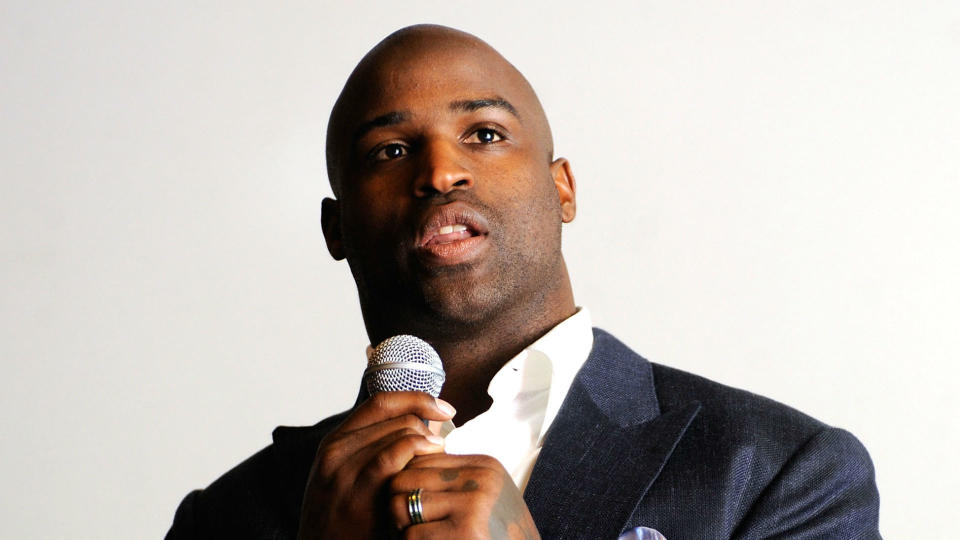Former Argo Ricky Williams speaks on medical marijuana, a possible CFL boon

Marijuana got Ricky Williams into the CFL, and he believes it might be crucial to saving all of football. The NFL is facing a lawsuit alleging its teams "intentionally disregarded players' health by providing painkillers," which (along with the ongoing concussion crisis in both the CFL and NFL) has many worried about the future of football. Williams, who played for the CFL's Toronto Argonauts as well as the NFL's New Orleans Saints, Miami Dolphins and Baltimore Ravens, credits marijuana for preserving his health during his football career (even if one of the suspensions he got over it forced him to come to Canada for a stint that was more successful than many realize). Other players in the CFL and NFL are following his lead, and marijuana may be important for helping them avoid painkiller addiction as well.
Since Williams' playing career ended, he's served as a college coach and as a Longhorn Network analyst. He spoke about the benefits of medical marijuana at the High Times SoCal Medical Cannabis Cup this week, on a panel titled "How Cannabis Will Save The NFL." However, while the NFL's still trying to prohibit medical marijuana, there's a test case north of the border; the CFL's lack of testing for marijuana means players are already exploring it instead of conventional painkillers. Here's what Williams had to say on the panel about the benefits of marijuana over painkillers:
Here are Williams' key comments:
"A couple years I led the NFL in carries, and somehow I was able to recover through the week. I got to a point in my career where I realized, ‘I’m not going to be able to do this much longer.’
“The teams don’t care, you know, they weren’t trying to take care of me. So, I had to take care of myself. One of the ways I took care of myself was using cannabis.”
“I’d go see the doctor, he’d give me some anti-inflammatories, some pain pills, and just try to rest,” Williams said. “That’s it. ... I think there’s a better way.”
The idea that marijuana may be more effective than painkillers in treating football players is not limited just to Williams. Patrick Hruby has written several good pieces on medical marijuana's usage among athletes for Sports on Earth and The Atlantic, and the NFL has considered softening its policies. Even the current policies can be avoided thanks to the league's highly-scheduled tests: former NFL RB Jamal Anderson told Bleacher Report's Mike Freeman in 2015 that an estimated 60 per cent of NFL players smoke marijuana. Former Chicago Bears' quarterback Jim McMahon told The Chicago Tribune's Robert McCoppin last week that medical marijuana allowed him to break his painkiller addiction. Other former NFLers like Nate Jackson and Kyle Turley are currently lobbying for marijuana to replace painkillers, given that an estimated 70 to 90 per cent of NFL players who used painkillers during their playing career went on abuse them, and Jackson told Pain News Network editor Pat Anson this week he credits marijuana with preserving his brain:
“When you compare it to what the alternative is in their training rooms; pills, pills, pills, that are being put into these guys’ hands and turning them into addicts. I was never big on those pills. I medicated with marijuana and it helped me and I think it helped save my brain.”
What does this all mean for the CFL? Well, the league has long had players who have used marijuana, and it's not tested for under the CFL's drug policy (which focuses on performance-enhancing drugs, and isn't actually conducting tests at all at the moment thanks to lab refusals). Players who do get caught with marijuana by police (in areas where possession is still illegal) have faced some consequences, including being cut (which was silly), but the CFL's far from hardline on marijuana despite the calls of some prohibitionists. If Canadian prime minister Justin Trudeau's plan to legalize recreational marijuana nationally comes through, there will be even less potential consequences for CFL players who want to use it.
At the moment, though, the CFL players who want to use marijuana for pain management can largely do so, provided they don't get into legal trouble obtaining or using it. That seems much smarter than the NFL's continued testing for it, especially considering the problems we've seen with conventional painkillers and the scientific studies and testimonies from players that suggest marijuana is a better alternative. This is one area where the CFL's ahead of the NFL, and hopefully that won't change under any new drug policy. Trying to crack down on football players' marijuana use is foolhardy, especially given what we know about the perils of going the conventional painkiller route.

 Yahoo Sports
Yahoo Sports 


